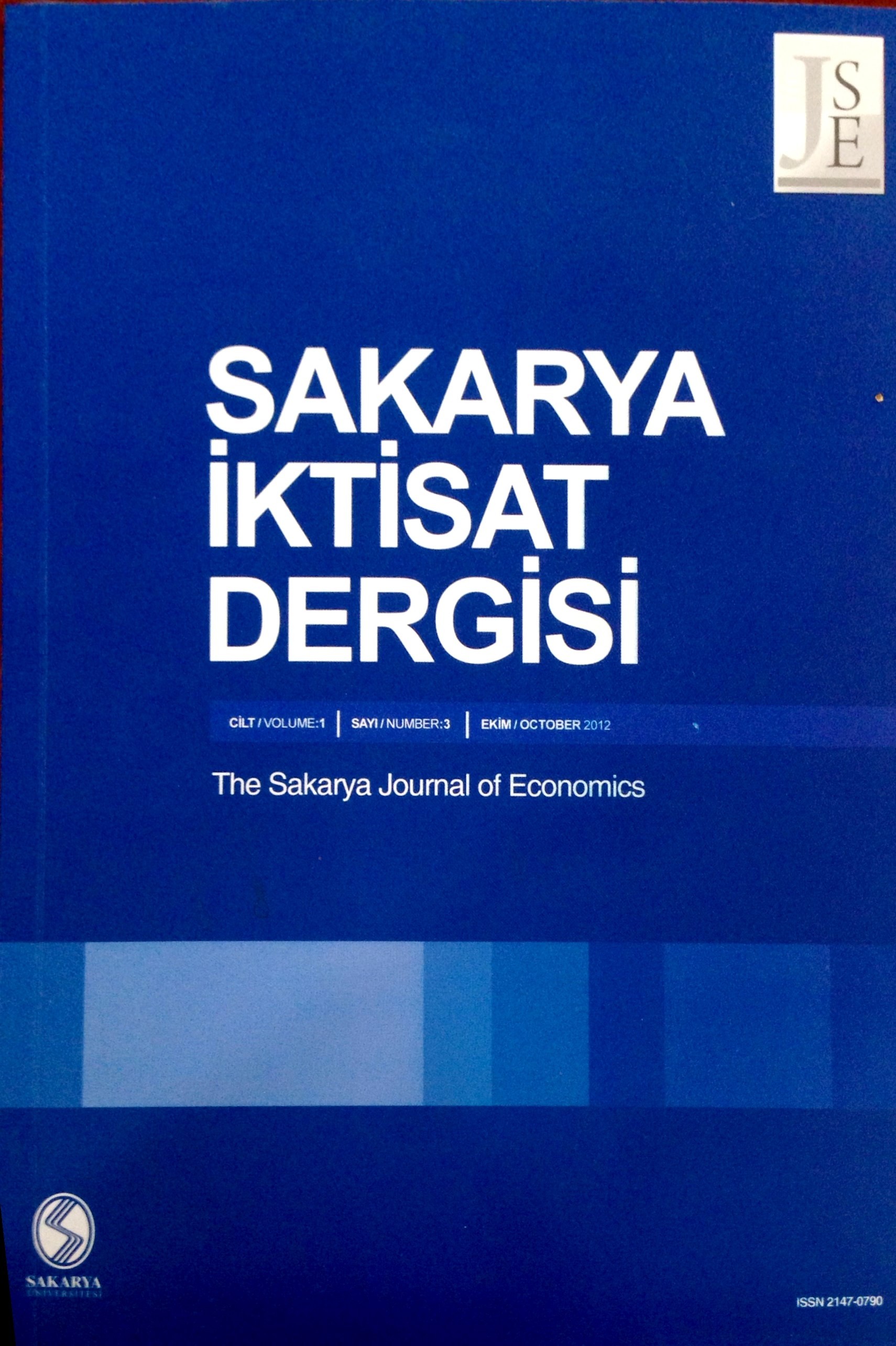DOĞRUDAN YABANCI YATIRIMIN FİNANSAL GELİŞME ÜZERİNDEKİ ETKİSİ: OECD ÖRNEĞİ
Doğrudan yabancı yatırımın (DYY), finansal gelişme üzerindeki etkisi, mevcut literatürde nispeten az ilgi görmüştür. Ayrıca, bu ilişkiyi inceleyen mevcut çalışmalar henüz bir fikir birliğine varamamıştır. Literatürdeki bu boşluğu gidermek ve literatüre katkıda bulunmak için bu çalışmada, 1990-2020 yılları arasında OECD ülkelerinde doğrudan yabancı yatırımın finansal gelişme üzerindeki etkisi sabit etkiler modeli ve sistem genelleştirilmiş momentler yöntemi (GMM) kullanılarak araştırılmıştır. Bulgular, DYY girişlerinin ev sahibi ülkedeki gelişmiş bir finansal sistemle ilişkili olduğunu göstermektedir. Buna ek olarak, bu çalışma, DYY'nin finansal gelişme endeksinin iki temel bileşeni olan finansal kurumlar endeksi ve finansal piyasalar endeksi üzerindeki etkisini de araştırmaktadır. Regresyon analizi, DYY'nin finansal piyasalar endeksi üzerindeki olumlu etkisinin, finansal kurumlar endeksi üzerindeki olumlu etkisinden yaklaşık olarak iki daha fazla olduğunu ortaya koymaktadır. Doğrudan yabancı yatırım ile finansal gelişme arasındaki olası çift yönlü ilişkiden kaynaklanabilecek potansiyel içsellik sorunun üstesinden gelmek için ise, GMM modeli kullanılmıştır ki bu model de sabit etkiler modelinden elde edilen sonuçları desteklemektedir. Ancak, DYY'nin finansal kurumlar endeksi ve finansal piyasalar endeksi üzerindeki etkisi, önceki sonucun aksine birbirine yakın bulunmuştur.
Anahtar Kelimeler:
Doğrudan yabancı yatırımlar, finansal gelişmişlik, sistem GMM
EFFECT OF FOREIGN DIRECT INVESTMENT ON FINANCIAL DEVELOPMENT: THE CASE OF OECD
The effect of foreign direct investment (FDI) on financial development has received relatively little attention in the existing literature. Furthermore, the current studies examining this relationship have yet to reach a consensus. To address this gap and contribute to the literature, this study employs the fixed effects model and the system generalized method of moments (GMM) to explore the impact of FDI on financial development within OECD countries from 1990-2020. In light of the findings, the study indicates that FDI inflows are linked to an improved financial system in the host country. In addition, this study explores the impact of FDI on the two key components of the financial development index, specifically the financial institutions index and the financial markets index. The regression analysis reveals that the beneficial influence of FDI on the financial markets index is roughly twice that on the financial institutions index. To deal with potential issues of endogeneity that may arise from the possible bidirectional relationship between FDI and financial development, the study employs the system GMM model, which supports the results obtained from the fixed effect model. However, the effect of FDI on the financial institutions index and financial markets index is found to be comparable in contrast to previous research.
Keywords:
Foreign direct investment, financial development, system GMM,
___
- Agbloyor, E. K., Abor, J., Adjasi, C. K. D., & Yawson, A. (2013). Exploring the causality links between financial markets and foreign direct investment in Africa. Research in International Business and Finance, 28, 118-134.
- Aibai, A., Huang, X., Luo, Y., & Peng, Y. (2019). Foreign direct investment, institutional quality, and financial development along the Belt and Road: An empirical investigation. Emerging Markets Finance and Trade, 55(14), 3275-3294.
- Aitken, B. J., & Harrison, A. E. (1999). Do domestic firms benefit from direct foreign investment? Evidence from Venezuela. American economic review, 89(3), 605-618.
- Alfaro, L., Chanda, A., Kalemli-Ozcan, S., & Sayek, S. (2004). FDI and economic growth: the role of local financial markets. Journal of international economics, 64(1), 89-112.
- Aqeel, A., Nishat, M., & Bilquees, F. (2004). The determinants of foreign direct investment in Pakistan [with comments]. The Pakistan Development Review, 651-664.
- Arellano, M., & Bond, S. (1991). Some tests of specification for panel data: Monte Carlo evidence and an application to employment equations. The review of economic studies, 58(2), 277-297.
- Arellano, M., & Bover, O. (1995). Another look at the instrumental variable estimation of error-components models. Journal of econometrics, 68(1), 29-51.
- Bayar, Y., & Gavriletea, M. D. (2018). Foreign direct investment inflows and financial development in Central and Eastern European Union countries: A panel cointegration and causality. International Journal of Financial Studies, 6(2), 55.
- Blundell, R., & Bond, S. (1998). Initial conditions and moment restrictions in dynamic panel data models. Journal of econometrics, 87(1), 115-143.
- Carkovic, M., & Levine, R. (2005). Does foreign direct investment accelerate economic growth. Does foreign direct investment promote development, 195, 220.
- Gökçeli, E., Fidrmuc, J., & Ghosh, S. (2022). Effect of Foreign Direct Investment on Economic Growth and Domestic Investment: Evidence from OECD Countries. European Journal of Business Science and Technology, 190.
- Henri, N., Luc, N. N., & Larissa, N. (2019). The long‐run and short‐run effects of foreign direct investment on financial development in African countries. African Development Review, 31(2), 216-229.
- Ibrahim, M., & Alagidede, P. (2018). Nonlinearities in financial development–economic growth nexus: Evidence from sub-Saharan Africa. Research in International Business and Finance, 46, 95-104.
- Kaidi, N., Mensi, S., & Ben Amor, M. (2019). Financial development, institutional quality and poverty reduction: worldwide evidence. Social Indicators Research, 141, 131-156.
- Kaur, M., Yadav, S. S., & Gautam, V. (2013). Financial system development and foreign direct investment: A panel data study for BRIC countries. Global Business Review, 14(4), 729-742.
- Majeed, A., Jiang, P., Mahmood, A., Khan, M. A., & Olah, J. (2021). The impact of foreign direct investment on financial development: new evidence from panel cointegration and causality analysis. Journal of Competitiveness, 13(1), 95.
- Mileva, E. (2008). The impact of capital flows on domestic investment in transition economies. Working Paper No. 871. European Central Bank.
- Saidi, K. (2018). Foreign direct investment, financial development and their impact on the GDP growth in low-income countries. International Economic Journal, 32(3), 483-497.
- Soumaré, I., & Tchana Tchana, F. (2015). Causality between FDI and financial market development: Evidence from emerging markets. The World Bank Economic Review, 29(suppl_1), S205-S216.
- ISSN: 2147-0790
- Yayın Aralığı: Yılda 4 Sayı
- Başlangıç: 2012
- Yayıncı: Sakarya Üniversitesi
Sayıdaki Diğer Makaleler
DOĞRUDAN YABANCI YATIRIMIN FİNANSAL GELİŞME ÜZERİNDEKİ ETKİSİ: OECD ÖRNEĞİ
ENFLASYON VE FAİZ İLİŞKİSİNİN FISHER VE NEO-FISHER ETKİLERİNİN PANEL EKONOMETRİK ANALİZİ
Karmaşık Uyarlanabilir bir Sistem Olarak Dilin Ortaya Çıkışı
Aziz KUTLAR, Ahmet GÜLMEZ, Pınar KOÇ, Abidin ÖNCEL
TÜRK SAVUNMA SANAYİSİNDEKİ GELİŞMELERİN EKONOMİYE ETKİLERİ (2000-2023)
